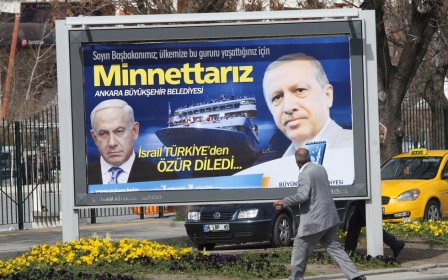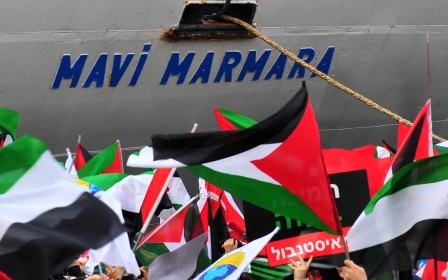ANALYSIS: Energy deals partly behind warming of Turkey-Israel relations

Half of the gas from Israel’s largest offshore field will be exported to Turkey over the next few decades, the leader of a top Turkish energy company forecasted on Tuesday.
“In terms of the eastern Mediterranean gas, the Turkish-Israeli friendship is based on long-lasting history,” Turcas Petrol CEO Bato Aksoy reportedly told members of the Energy Journalists and Media Association in Ankara on Tuesday.
Aksoy’s comments come as relations between Israel and Turkey, which broke down after an Israeli attack on the Gaza-bound Turkish ship Mavi Marmara in May 2010, look poised to be re-established.
One topic reportedly on the agenda at a series of secret recent meetings between top level Turkish and Israeli officials in Switzerland was gas. And while energy concerns are not the only motivation behind the detente, some might say the timing for a natural gas deal between the two countries could not be better.
Turkey’s top two gas suppliers – which together account for the majority of Turkish gas imports - are Russia and Iran, both countries with which Turkey currently has tense relations.
Meanwhile, Turkish demand for gas is growing between 6 and 7 percent annually, said Galip Dalay, a research director at Al Sharq Forum and senior associate fellow on Turkey and Kurdish Affairs at Al Jazeera Center for Studies.
“There are not major expectations that Russia will cut the gas,” Dalay told Middle East Eye. However, there is fear is that Russia is unlikely to deliver on Turkey’s increasing needs, he said.
For Israel, Turkey represents a potential long term customer less than a week after Prime Minister Benjamin Netanyahu, following a nearly year-long antitrust battle, gave the go ahead for US and Israeli companies to develop the country’s largest gas field – and months after Egypt, a would-be Israeli gas importer, discovered its largest ever reserves.
According to Globes, an Israeli financial daily, the owners of the US-based Noble Energy and Israel’s Delek Group which own the rights to Leviathan, named after a whale-like creature mentioned in the Bible, have been negotiating Israeli gas exports with Turkey’s Turcas and Zorlu Petrogas Petrol Gaz for months.
Turcas’ board member Matthew Bryza reportedly told Globes that Turkey would buy Israeli gas for a lower rate than other suppliers, but at a higher price than Egypt was ready to pay Israel.
Aksoy, Turcas’ CEO, told Globes that Israeli gas could help Turkey become an energy hub.
But after protests from Jordanians, Egyptians and Palestinians over Israeli gas sales to their countries in recent years – deals that the US State Department has actively encouraged as a way to secure lasting peace in the eastern Mediterranean - would the Turkish public accept such a deal?
Despite diplomatic relations at a low in recent years, Dalay points out that trade between the two countries has increased with Turkey serving as a major tourist destinations for Israelis.
“So it is not something alien to the Turkish public – relations with Israel,” he said. “The public will care more about what is the nature of what Turkey is getting in return than why Turkey is doing it in the first place.”
New MEE newsletter: Jerusalem Dispatch
Sign up to get the latest insights and analysis on Israel-Palestine, alongside Turkey Unpacked and other MEE newsletters
Middle East Eye delivers independent and unrivalled coverage and analysis of the Middle East, North Africa and beyond. To learn more about republishing this content and the associated fees, please fill out this form. More about MEE can be found here.




